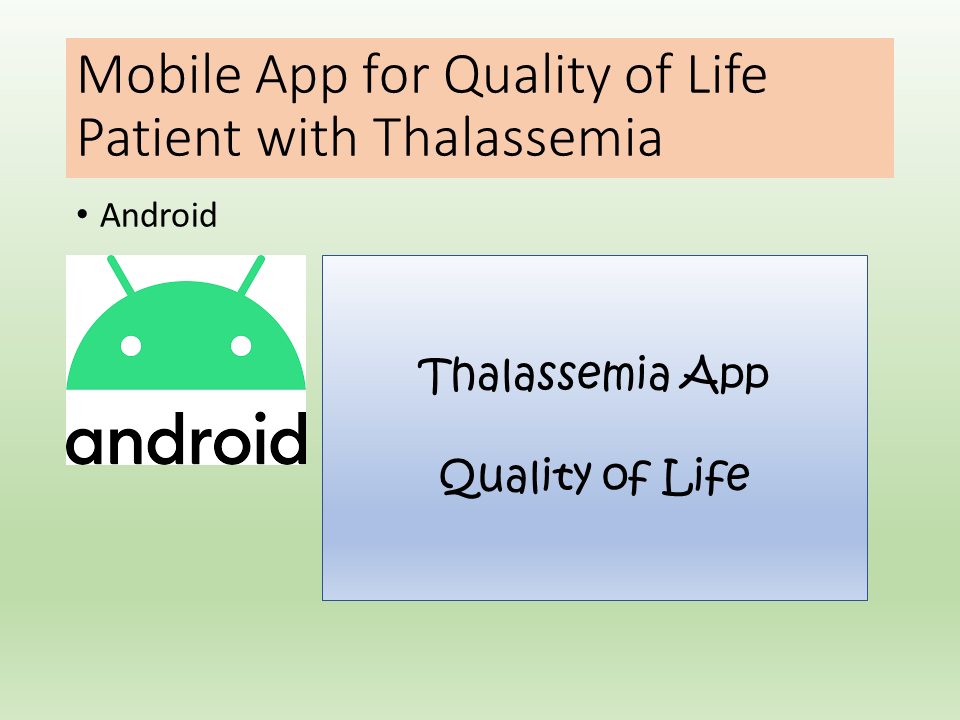A Mobile App Deployment for Quality-of-Life Patient with Thalassemia: A narrative review
DOI:
https://doi.org/10.23917/bik.v16i1.1371Keywords:
thalassemia patient, mobile application, quality of lifeAbstract
Thalassemia is a hereditary hemolytic anemia disease that is inherited from parents. Occurs due to the inability of red blood cells to form hemoglobin. Thus causing thalassemia patients to undergo transfusion therapy for life. The mobile application contains detailed information about thalassemia that can be easily accessed by thalassemia patients and their families aiming to maintain the quality of life of patients with thalassemia. The purpose of this literature review is to determine the effectiveness of mobile applications applied to the quality of life of patients thalassemia. The method used in this preparation is by electronic search of online databases, namely: Google Scholar Science Direct, PROQUEST. The criteria for writing are full text and publications in 2018-2022. Research search found 10 articles had been extracted. The results obtained are mobile applications for the quality of life of patients with thalassemia have a positive response and dynamically need to be developed.
Downloads
References
Akram, S., & Ahmed Khan, M. (2022). Implementation, Patient Satisfaction and Usability of Telemedicine Services for Pediatric Thalassemia Cases in Balochistan During COVID-19 Pandemic and Beyond. American Journal of Pediatrics, 8(2), 126. https://doi.org/10.11648/j.ajp.20220802.23
Alturaiki, A. M., Banjar, H. R., Barefah, A. S., Alnajjar, S. A., & Hindawi, S. (2022). A Smart Chatbot for Interactive Management in Beta Thalassemia Patients. International Journal of Telemedicine and Applications, 2022, 1–13. https://doi.org/10.1155/2022/9734518
Banjar, H. R., Zaher, G. F., Almutiry, H. S., Alshamarni, A. S. A., Almouhana, G. I., Alahwal, H. M., Bahashwan, S., Barefah, A. S., Alnajjar, S. A., & Alharbi, H. M. (2021). Web-based expert system with quick response code for beta-thalassemia management. Health Informatics Journal, 27(1). https://doi.org/10.1177/1460458221989397
Byrou, S., Makrigiorgos, G. M., Christofides, A., Kallikas, I., Papasavva, T., & Kleanthous, M. (2018). Fast Temperature-Gradient COLD PCR for the enrichment of the paternally inherited SNPs in cell free fetal DNA; an application to noninvasive prenatal diagnosis of ?-thalassaemia. PLoS ONE, 13(7), 1–16. https://doi.org/10.1371/journal.pone.0200348
Chen, Y., Huang, X., Lu, Q., Lu, J., Huang, X., Luo, Y., & Huang, F. (2022). Clinical Study of Mobile Application- (App-) Based Family-Centered Care (FCC) Model Combined with Comprehensive Iron Removal Treatment in Children with Severe Beta Thalassemia. Applied Bionics and Biomechanics, 2022. https://doi.org/10.1155/2022/4658709
Farhady, S., Sepehri, M. M., & Pourfathollah, A. A. (2020). Evaluation of effective factors in the acceptance of mobile health technology using the unified theory of acceptance and use of technology (UTAUT), case study: Blood transfusion complications in thalassemia patients. Medical Journal of the Islamic Republic of Iran, 34(1), 1–7. https://doi.org/10.34171/mjiri.34.83
G. Pavani, A. Fabiano, M. Laurent et al., “Correction of?-thal- assemia by CRISPR/Cas9 editing of the ?-globin locus in human hematopoietic stem cells,” Blood Advances, vol. 5, no. 5, pp. 1137–1153, 2021.
Galanello R, Piras S, Barella S, Leoni GB, Cipollina MD, Perseu L, Cao A. Cholelithiasis and Gilbert's syndrome in homozygous beta-thalassemia. Br J Haematol. 2001; 115:926–928. doi: 10.1046/j.1365-2141.2001.03200x
Gharaati, F., Aghamolaei, T., Hosseini, Z., Davoodi, S. H., Hassani, laleh, Mohamadi, R., Mohsseni, S., & Soleimani-Ahmadi, M. (2019). Effect of A Mobile-Phone Mediated Based Education on Self-Care Behaviors of Patients With Thalassemia Major. Journal of Caring Sciences, 8(3), 149–155. https://doi.org/10.15171/jcs.2019.022
Hatem, S., Long, J. C., Best, S., Fehlberg, Z., Easpaig, B. N. G., & Braithwaite, J. (2022). Mobile Apps for People With Rare Diseases: Review and Quality Assessment Using Mobile App Rating Scale. Journal of Medical Internet Research, 24(7), 1–12. https://doi.org/10.2196/36691
Jahan, A., Singh, G., Gupta, R., Sarin, N., & Singh, S. (2021). Role of Red Cell Indices in Screening for Beta Thalassemia Trait: an Assessment of the Individual Indices and Application of Machine Learning Algorithm. Indian Journal of Hematology and Blood Transfusion, 37(3), 453–457. https://doi.org/10.1007/s12288-020-01373-x
Luthra, R., Kaur, S., & Bhandari, K. (2021). Applications of CRISPR as a potential therapeutic. Life Sciences, 284(June), 119908. https://doi.org/10.1016/j.lfs.2021.119908
Mai, A. D., Harton, G. L., Quang, V. N., Van, H. N., Thi, N. H., Thuy, N. P., Le Thi, T. H., Minh, D. N., & Quoc, Q. T. (2021). Development and clinical application of a preimplantation genetic testing for monogenic disease (PGT-M) for beta thalassemia in Vietnam. Journal of Assisted Reproduction and Genetics, 38(2), 365–374. https://doi.org/10.1007/s10815-020-02006-y
No, P., Hariramani, S., Gaddalay, S., Kale, A., & Nagargoje, G. (2018). Available Online at www.journalijcar.org. 7(4), 4–7.
Paramore, C., Levine, L., Bagshaw, E., Ouyang, C., Kudlac, A., & Larkin, M. (2021). Patient- and Caregiver-Reported Burden of Transfusion-Dependent ?-Thalassemia Measured Using a Digital Application. Patient, 14(2), 197–208. https://doi.org/10.1007/s40271-020-00473-0
Setiawan, H., Setiawan, D., Suhanda, & Mustopa, A. H. (2021). Development of Android-based Mobile Application “Cyber Gen” for Genetic Counselling Implementation among Thalassemia Patients. Journal of Physics: Conference Series, 2111(1). https://doi.org/10.1088/1742-6596/2111/1/012037
Singha, K., Yamsri, S., Chaibunruang, A., Srivorakun, H., Sanchaisuriya, K., Fucharoen, G., & Fucharoen, S. (2022). Diagnostic value of fetal hemoglobin Bart’s for evaluation of fetal ?-thalassemia syndromes: application to prenatal characterization of fetal anemia caused by undiagnosed ?-hemoglobinopathy. Orphanet Journal of Rare Diseases, 17(1), 1–10. https://doi.org/10.1186/s13023-022-02197-w
Viswanadham Manasa, K. Vanitha, M. Venkataswamy, P. Prabhakar, Alluri Ramesh “Formulation and Evaluation of Aqueous Enteric Coated Delayed Release Omeprazole Pellets” Research Journal of Pharmaceutical Dosage Forms and Technology, A and V publications, 8(1): January-March, 2016, (1-4).
Ward, R., & Taha, K. M. (2016). Patient Involvement as Experts in the Development and Assessment of a Smartphone App as a Patient Education Tool for the Management of Thalassemia and Iron Overload Syndromes. Hemoglobin, 40(5), 323–329. https://doi.org/10.1080/03630269.2016.1217875
Wood WG. Increased HbF in adult life.BaillieresClin Haematol. 1993;6(1):177-213. [PubMed}

Downloads
Submitted
Accepted
Published
How to Cite
Issue
Section
License
Copyright (c) 2023 Afifah Ayu, Sigit Mulyono

This work is licensed under a Creative Commons Attribution 4.0 International License.


















